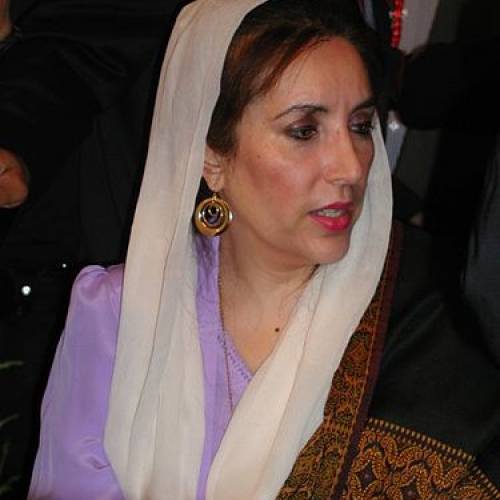 https://heaven.world/en/benazir-bhutto
https://heaven.world/en/benazir-bhutto
Firstname
Benazir
Lastname
Bhutto
Name
Benazir Bhutto
lived from:
1953-06-21
lived until:
2007-12-27
Benazir Bhutto was the 11th Prime Minister of Pakistan and the leader of the centre-left Pakistan Peoples Party. She was the first woman to head a Muslim majority nation, and the only one to head it twice.
Born in Karachi, her father, Zulfikar, went on to serve as Pakistan's prime minister in the 1970s. Benazir was educated at Harvard and at Oxford, also serving as the first Asian woman to preside over the Oxford Union. After the 1977 military coup which overthrew her father's government, Benazir along with her family were repeatedly placed under house arrest. After her father was hanged in 1979 Benazir, along with her mother Nusrat, went on to lead the Movement for the Restoration of Democracy while still under house arrest. In 1984 Benazir, along with her family, left for London where she resided until 1988. After her return, Benazir successfully led the People's Party through the 1988 election.
After winning support from a coalition government in the national assembly, Benazir assumed the Prime Minister's Office in December 1988. Benazir however struggled to maintain control over power, marked by political and economic instability. Benazir's government was dismissed on August 7, 1990 by the then President who accused her administration of corruption and nepotism. Benazir went on to once again lead her party through the 1990 election, however failed to win a parliamentary majority. Later in 2012, Pakistan's Supreme Court would rule that the 1990 election was rigged by Pakistans Inter-Services Intelligence in favour of the conservative Islami Jamhoori Ittehad. Despite electoral fraud, Benazir served as the Leader of the Opposition until the conservative government was also dismissed in 1996 over charges of corruption.
Bhutto successfully led her party to victory in the 1993 parliamentary elections and once again became the prime minister. Her second term was marked with several controversies including the assassination of her brother Murtaza during a police encounter in Karachi. Her husband and cabinet member, Asif Ali Zardari, was indicted for the murder but later exonerated. Even though her government survived an attempted coup d'état in 1995, she and her husband were accused of a bribery scandal around a deal with Dassault, once again leading the President to dismiss her government over a series of graft charges. Her husband went on to serve eight years in prison while she led her party to an unsuccessful re-election campaign during the 1997 election.
In 1998, Benazir went into self-exile to her estate in Emirates Hills in Dubai, leading her party mainly through proxies. Her reputation was damaged by a widening corruption inquiry, a 1998 New York Times investigative report traced more than $100 million in offshore assets to Benazir and her family, including the infamous 350-acre Rockwood Estate in Surrey. In August 2003, a Swiss court convicted Benazir and Zardari of receiving kickbacks from a government contract with two Swiss companies.
She returned to Pakistan on 18 October 2007 after she was granted amnesty on corruption charges as part of a controversial agreement. On 19 October 2007, Benazir returned to Karachi, where her campaign bus came under attack leaving dozens of her supporters dead, while she remained safe. Benazir was assassinated later that year in a similar attack while leaving a campaign event in Rawalpindi. She was buried at the Bhutto family mausoleum in rural Sindh.
Benazir left a deeply polarising legacy: her career has been celebrated as a triumph for women in the Muslim world and for the global fight against Islamic extremism. At the same time, she is accused of corruption and bad governance. Her death was followed by the victory of People's Party led by her husband, Asif, and son Bilawal, with the former becoming Pakistan's president in 2008. The Guardian, writing about Benazir, termed her " a victim, as well as in part a culprit, of its chronic instability". Writing her obituary, The New York Times referred her as "a woman of grand aspirations with a taste for complex political maneuverings". Several universities and public buildings in Pakistan bear Benazir's name, while her career influenced a number of activists including Malala Yousafzai. She authored two books, including Daughter of the East and Reconciliation.
Rawalpindi (Punjab), Pakistan
https://en.wikipedia.org/wiki/Benazir_Bhutto